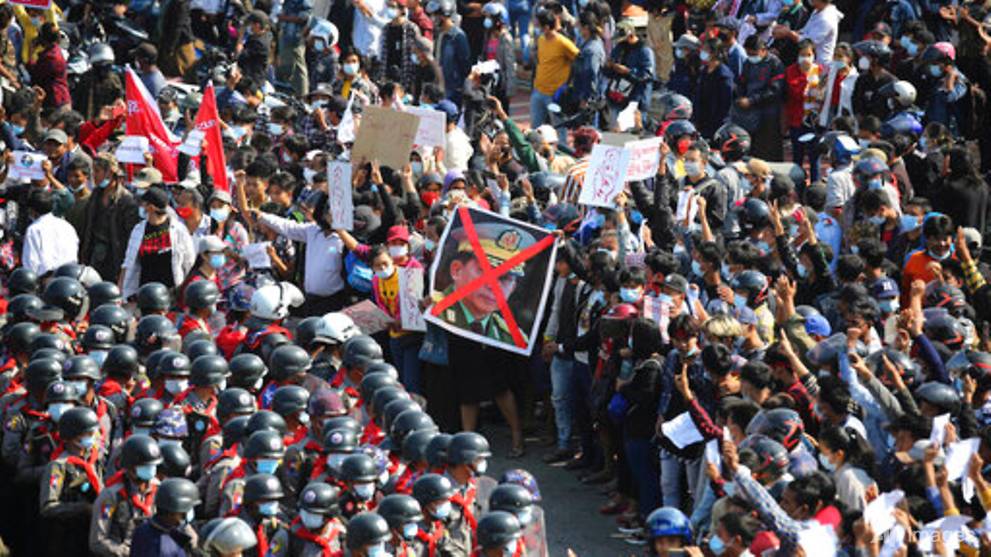YANGON: Martial law was declared in parts of Myanmar's second-largest city Mandalay on Monday (Feb 8), after hundreds of thousands rallied across the country against the coup and the military issued a stern warning against further protests.
The orders cover seven townships in Mandalay, banning people from protesting or gathering in groups of more than five, and a curfew will run from 8pm until 4am, the general administration department said in a statement.
A similar declaration has been made in a township in Ayeyarwaddy further south and announcements concerning other localities are expected to trickle out tonight.
"This order is applied until further notice," one Mandalay township statement said.
"Some people ... are behaving in a worrying way that can harm the safety of public and law enforcement. Such behaviours can affect stability, safety of people, law enforcement, and peaceful existence of villages and could create riots, that's why this order bans gathering, speaking in public, protest by using vehicles, rallies," the statement said.
READ: Myanmar police fire water cannon in Naypyidaw, warn protesters to disperse or face force
The junta has so far refrained from using deadly force against the demonstrations sweeping most of the country, but with pressure building riot police fired water cannon in an attempt to disperse thousands gathered in Naypyidaw.
The military last week detained Aung San Suu Kyi and dozens of other members of her National League for Democracy party, ending a decade of partial civilian rule and triggering international condemnation.
In the face of an increasingly bold wave of defiance, state broadcaster MRTV warned that opposition to the junta was unlawful and signalled a potential crackdown.
"Action must be taken according to the law with effective steps against offences which disturb, prevent and destroy the state's stability, public safety and the rule of law," said a statement read by an announcer on the channel.
READ: Tens of thousands protest in Myanmar against military coup
Tens of thousands of people overcame a nationwide internet blockade to rally over the weekend in the first major outpourings of opposition to the coup.
The movement built on Monday, with protests across the country and the start of a nationwide strike.
In Yangon, the nation's commercial capital, crowds spilled onto the city's main roads, immobilising traffic and dwarfing the previous day's rally.
"Down with military dictatorship" and "release Daw Aung San Suu Kyi and arrested people", protesters chanted, flashing the three-finger salute that has come to symbolise their movement as car horns were honked in support.
Calls for a nationwide strike gathered momentum over the weekend, with textile workers, civil servants and railway employees walking out of work in the commercial hub.
"This is a work day, but we aren't going to work even if our salary will be cut," one protester, 28-year-old garment factory worker Hnin Thazin, told AFP.
Construction worker Chit Min, 18, joined the Yangon rally, saying his loyalty to Suu Kyi outweighed concerns about his financial situation.
"I am jobless now for a week because of the military coup, and I am worried for my survival," he told AFP.
Similarly large crowds marched in Mandalay, the country's second-largest city, many clutching photos of Suu Kyi and waving the red flags of her party.
Police attempted to disperse thousands of people gathered on a highway in Naypyidaw, where the deposed leader is believed to be detained.
Water cannon was fired into the crowd, injuring at least two demonstrators, according to a photographer on the scene.
Huge rallies were also reported across much of the country, from Muse on the Chinese border to the southern cities of Dawei and Hpa-an.
Protesters started to disperse in the early evening.
Commentary: Myanmar coup poses first foreign policy test for Biden on Southeast Asia
STATE OF EMERGENCY
Myanmar's generals detained Aung San Suu Kyi, 75, and other top NLD leaders in pre-dawn raids last Monday, justifying the coup by claiming fraud in last November's elections, which the party won in a landslide.
The junta proclaimed a one-year state of emergency, promising to hold fresh elections after that without offering any precise timeframe.
US President Joe Biden has led global calls for the generals to relinquish power.
Pope Francis on Monday called for the prompt release of imprisoned political leaders.
"The path to democracy undertaken in recent years was brusquely interrupted by last week's coup d'etat," he told a gathering of diplomats.
"This has led to the imprisonment of different political leaders, who I hope will be promptly released as a sign of encouragement for a sincere dialogue."
South East Asian lawmakers have also urged Myanmar's military to respect the people's rights to protest.
"As peaceful demonstrations grow, the risk of violence is real. We all know what the Myanmar army is capable of: mass atrocities, killing of civilians, enforced disappearances, torture, and arbitrary arrests, among others," Tom Villarin from ASEAN Parliamentarians for Human Rights said.
Commentary: Myanmar military never had any intention of giving up power
DEFIANCE
Other bold displays of defiance inside Myanmar have included a nightly clamour of people banging pots and pans -- a practice traditionally associated with driving out evil spirits.
Myanmar's military ruled the country for decades before allowing civilian rule a decade ago.
Aung San Suu Kyi spent large chunks of her life under house arrest for her opposition to the previous dictatorship, winning the Nobel peace prize for her efforts.
Kyaw Zin Tun, an engineer, said Monday while protesting in Yangon he remembered the fear he felt growing up under junta rule in the 1990s.
"In the last five years under the democratic government, our fears were removed. But now fear is back again with us, therefore, we have to throw out this military junta for the future of all of us," the 29-year-old told AFP.
https://news.google.com/__i/rss/rd/articles/CBMibGh0dHBzOi8vd3d3LmNoYW5uZWxuZXdzYXNpYS5jb20vbmV3cy9hc2lhL21hcnRpYWwtbGF3LXBhcnRzLW15YW5tYXItcHJvdGVzdHMtbWlsaXRhcnktY291cC1tYW5kYWxheS0xNDE0MDE3MNIBAA?oc=5
2021-02-08 12:57:30Z
52781362295733


